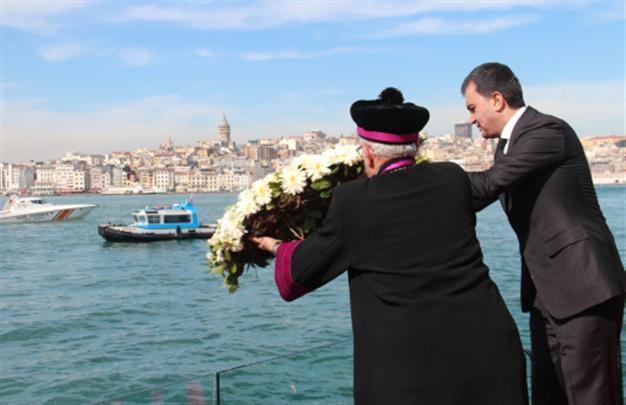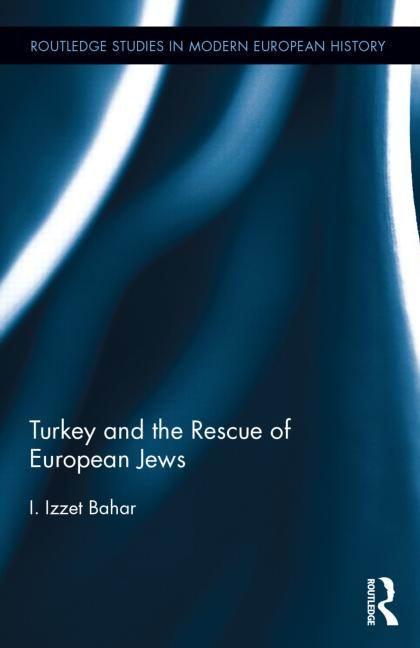Turkey and ‘the rescue of European Jews’
William Armstrong - william.armstrong@hdn.com.tr

Turkey commemorated the anniversary of the Struma disaster for the first time in February this year. In the disaster, a ship carrying Jewish refugees during World War II was hit by a Soviet submarine torpedo and sank in the Black Sea, killing 768 passengers.
‘Turkey and the Rescue of European Jews’ by I. İzzet Bahar (Routledge, 308 pages, £80)
When talking about Jews in Turkey, it is rarely long before Turks make a humble brag about Ottoman tolerance providing a refuge for Sephardic Jews fleeing Spain at the end of the 15th century. This remarkable episode has long been a trump card whenever worries about anti-Jewish sentiment have been raised inside or outside the country.

In 1992, ahead of the 500th anniversary of the expulsion from Spain, Turkey’s Jewish community established the Quincentennial Foundation, which trumpeted “500 years of coexistence” in Turkish lands and verified the loyalty of Jews to the Turkish state. As its mission statement said, the foundation’s purpose was “to remind the whole world, by all available means, [of] the high human qualities of the Turkish people as Nation and State.” The foundation helped the international image of Turkey at the time, otherwise battered over a range of human rights issues.
The commemorations of 1492 also became closely linked to a new emphasis on Turkish humanitarian efforts on behalf of Jews during the Second World War. A flood of cultural and academic production presented Turkey, a neutral state during the war, as protector of Jewish victims of the Nazi era - a role apparently hitherto ignored. The Jewish Museum of Turkey in Istanbul, opened by the Quincentennial Foundation in 2001, reflects this narrative, presenting a carefully airbrushed history of Jews in Turkish lands. Eliding seismic changes over time - from the tolerance of the Ottoman centuries to the more problematic republican years - the museum presents the last 500 years as an almost uninterrupted bed of roses for Jews in Turkey, while adding a few myths of its own.
The title of this new book “Turkey and the Rescue of European Jews” has an ironic ring. In it, author İzzet Bahar examines “whether the image that was aggressively created after the 1990s, of Turkey as protector and savior of the Jews, can be justified in light of archival sources.” Bahar particularly focuses on three areas where the narrative has developed: Turkey’s recruitment of German-Jewish academics forced out of their academic posts by the Nazis, its response to the predicament of Turkish Jews stranded in France during World War II, and its approach to the Jewish refugee problem during the war.
The result is a thorough debunking of what Bahar describes as an elaborate “myth.” Through close reexamination of the sources, he concludes that most cultural production on the issue since the 1990s badly misrepresents events. His research is scrupulous, digging around official memos and diplomatic memoirs to put together an intellectual demolition job. He mercilessly debunks the major 2011 film “The Turkish Passport,” which presents a seductively embellished account of Turkish diplomats’ efforts to save imperiled Jews. He also deconstructs the many factual and methodical errors in historian Stanford Shaw’s 1991 book “Turkey and the Holocaust.” Despite those errors, Shaw’s book was very influential, becoming a kind of urtext for the powerful but simplistic Quincentennial Foundation narrative.
As for Bahar’s work, its presentation of the evidence could certainly be a little clearer. For all its scholarly intricacy, following the thread throughout the book is often rather exhausting, and more muscular editing would certainly not have gone amiss. Still, this should certainly not put off those interested in the issue.
Speaking at the reopening of the renovated Great Synagogue in Edirne in March, Deputy Prime Minister Bülent Arınç announced that “there is no anti-Semitism in Turkey,” and “there is no phobia compared to Islamophobia in the West.” Not only does political point-scoring over the matter leave a bad taste, Arınç’s words were also highly selective. They ignore the nervous state of Jews in Turkey today amid widespread anti-Semitism, which is at least tacitly endorsed by many officials.
The general climate for Turkey’s Jews has not been good since the foundation of the republic in 1923. The Jewish population in the country dropped from 200,000 in the early 1920s to 78,000 in 1935, and is today little over 15,000. Those who remained were hit by the punitive wealth tax of the single-party regime during the Second World War, followed by versions of aggressive nationalism in the decades since. Although today Ankara may be a long way from the dark days of imposing wealth taxes on religious minorities, life remains quite precarious for Turkish Jews. Bahar’s book is a good reminder that political polemics on the issue - whether sympathetic or hostile to the current government - will not change this.

 In 1992, ahead of the 500th anniversary of the expulsion from Spain, Turkey’s Jewish community established the Quincentennial Foundation, which trumpeted “500 years of coexistence” in Turkish lands and verified the loyalty of Jews to the Turkish state. As its mission statement said, the foundation’s purpose was “to remind the whole world, by all available means, [of] the high human qualities of the Turkish people as Nation and State.” The foundation helped the international image of Turkey at the time, otherwise battered over a range of human rights issues.
In 1992, ahead of the 500th anniversary of the expulsion from Spain, Turkey’s Jewish community established the Quincentennial Foundation, which trumpeted “500 years of coexistence” in Turkish lands and verified the loyalty of Jews to the Turkish state. As its mission statement said, the foundation’s purpose was “to remind the whole world, by all available means, [of] the high human qualities of the Turkish people as Nation and State.” The foundation helped the international image of Turkey at the time, otherwise battered over a range of human rights issues.